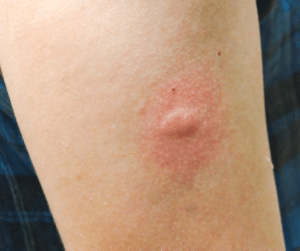Understanding the Impact of Bites and Stings in Seniors

Understanding Bites and Stings
There are a variety of pests that can cause issues with senior health. Even more interesting are the side effects from bites and stings, especially when they mimic flu-like symptoms. This can make it hard for seniors to truly know what’s going on. However, when they have elder care support, they have a better chance of finding the root cause of their symptoms, which leads to better care. Consider the following and what symptoms might be seen:
- Insect Bites: Frequently, bites from insects such as fleas, ticks, and mosquitoes can result in flu-like symptoms. While ticks are notorious for spreading the Lyme disease virus, mosquitoes can also spread diseases such as the West Nile virus. Similar to flu-like symptoms, these illnesses can cause fever, aches in the body, and exhaustion.
- Spider Bite Reactions: Certain spider bites, such as those from the brown recluse or black widow, can cause systemic reactions. Similar to flu symptoms, symptoms may include fever, nausea, and soreness in the muscles. Severe symptoms from spider bites are uncommon, though.
- Snake Bites: Although less frequent, bites from snakes can also present flu-like symptoms. The type of snake and the venom injected will determine the symptoms, which can include weakness, fever, and chills. Bites from venomous snakes can be fatal and necessitate prompt medical attention.
Caring for Bites and Stings
The first step is to identify what’s going on. If seniors didn’t see the spider or insect that caused their symptoms—which is quite often the case—they might not always realize that it was a bite or sting. However, elder care can be on the lookout for any strange symptoms and help seniors get medical help right away if the symptoms worsen or persist.
Regardless of the root cause, it’s important to wash the affected area to avoid infection. To lessen discomfort and swelling, elder care might also apply a cold compress. Additionally, it’s important not to scratch the area and make it more irritated. Seniors can talk with their medical team about medications or lotions that might help reduce the need to scratch.
Insect bites or stings can cause severe allergic reactions in certain seniors. While watching for other symptoms, elder care can also be mindful of other issues, such as facial or throat swelling and trouble breathing. Additionally, they can encourage seniors to tell them if their heart starts beating faster and ensure medical care is received right away.
Elder care can also assist seniors in taking precautions to steer clear of future bites and stings. This can include staying away from regions known to be home to poisonous animals, applying insect repellent, and dressing in long sleeves and pants when going outside. For seniors who enjoy spending time outdoors, it’s crucial to remain knowledgeable about the diseases that local snakes, spiders, and insects may carry. With the right information, they can proactively safeguard themselves from harm.
If you or an aging loved one are considering Elder Care in East Hampton, NY, call the caring staff at Artful Home Care today at (631) 685-5001
- What Can Seniors Do to Improve Their Social Health? - April 21, 2025
- The Hidden Safety Benefits of an Organized Home - April 3, 2025
- Artful Home Care Presents Planning Your Legacy: An End-of-Life Strategy Session - March 27, 2025

